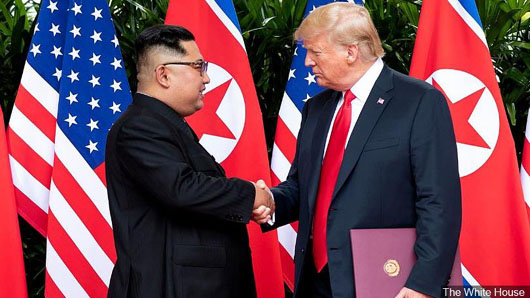by WorldTribune Staff, January 25, 2019
As he prepares for a second summit with North Korean leader Kim Jong-Un, U.S. President Donald Trump is hitting back at critics who claim there has been little progress made from the first summit’s stated goal of the North’s denuclearization.

“The Fake News Media loves saying ‘so little happened at my first summit with Kim Jong Un.’ Wrong!” Trump tweeted on Jan. 24 “After 40 years of doing nothing with North Korea but being taken to the cleaners, & with a major war ready to start, in a short 15 months, relationships built, hostages & remains … back home where they belong, no more Rockets or M’s being fired over Japan or anywhere else and, most importantly, no Nuclear Testing.”
“This is more than has ever been accomplished with North Korea, and the Fake News knows it. I expect another good meeting soon, much potential!,” Trump said.
However Bruce Klingner of the conservative Heritage Foundation has argued that no progress on denuclearization has been made since Trump and Kim met in Singapore last June.
“It’s not so much that the process has been derailed, it simply never left the station,” Klingner said.
Klingner, who from 1996 to 2001 was the CIA’s deputy division chief for Korea, said Trump made three major mistakes in Singapore: accepting a poorly-crafted summit statement that was weaker than predecessor agreements, unilaterally canceling allied military exercises (at least nine have been canceled to date), and warmly praising Kim, who is on the U.S. sanctions lists for human rights violations.
“During a second summit, Trump must insist on tangible steps toward North Korean denuclearization, including a data declaration of the regime’s nuclear and missile programs,” Klingner said. “Trump shouldn’t offer more concessions nor agree to reduce UN and US sanctions until Kim moves beyond the symbolic gestures it has taken so far.”
Related coverage from Geostrategy-Direct have highlighted the North-South, China and U.S. intelligence dimensions to the showdown that have not been reported in the West:
- Burst of ‘state-sponsored smuggling’ said to follow each Xi-Kim summit
- South Korea white paper removes North Korea as ‘enemy’
- Long-secret U.S.-North Korea intelligence ties revealed on eve of 2nd summit
Former Defense Secretary William Perry, who negotiated the U.S.’s last agreement with North Korea when he led the Pentagon in the 1990s, said Trump deserves full credit for breaking the ice with Kim, but “it doesn’t relate to giving up their nuclear weapons. They have stopped testing, which is good, and they’ve stopped testing long-range missiles, which is good, but they’ve done nothing to dismantle their nuclear arsenal and there’s no evidence today thinking about doing that.”
The 38 North think tank, which focuses one North Korea, has released a new white paper on what it calls a “pragmatic approach to nuclear safeguards and verification.” The think tank concludes that Kim Jong-Un must be convinced he doesn’t need his nukes to hold on to power.
“Realistically, the DPRK will seek to retain what it regards as an effective nuclear deterrent until it is convinced it no longer needs nuclear weapons to ensure its survival and the survival of the regime – and until it is convinced that the risks involved with having nuclear weapons, and the political, economic and opportunity costs, exceed the perceived benefit. Accordingly, progress on denuclearization and associated verification will depend on progress on broader issues, especially the development of a peace process and a sustainable relationship with the United States,” 38 North said.
Check Out Geostrategy-Direct __________ Jump Start the U.S. Media
